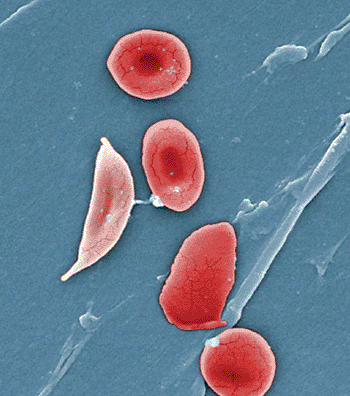Genomic Analyses Improves Transfusion Therapy for Sickle Cell Disease
By LabMedica International staff writers
Posted on 25 Dec 2013
Molecular methods, including customized DNA microarrays, are increasingly used to complement serologic methods in predicting blood groups. Posted on 25 Dec 2013
Red cell (RBC) blood group alloimmunization remains a major problem in transfusion medicine and patients with sickle cell disease (SCD) are at particularly high risk for developing alloantibodies to RBC antigens compared to other multiply transfused patient populations.

Image: Scanning electron micrograph of blood from a patient with sickle cell anemia (Photo courtesy of the OpenStax College).
Immunologists at the New York Blood Center (NY, USA) and their colleagues at the Children's Hospital & Research Center Oakland (CA, USA) determined the diversity and frequency of RH alleles in African-Americans to assess the performance of a DNA microarray for RH allele determination. Hemagglutination is the classical method used to test for blood group antigens, but depending on the typing methods and reagents used may result in discrepancies that preclude interpretation based on serologic reactivity alone.
The scientists tested two sets of samples: individuals with known variant Rh types and randomly selected African-American donors, and patients with SCD. Standard hemagglutination tests were used to establish the Rh phenotype, and complementary DNA (cDNA)- and genomic (gDNA)-based analyses including sequencing, polymerase chain reaction-restriction fragment length polymorphism (PCR-RFLP), and customized Rh blood group, D antigen (RHD) and Rh blood group, CcEe antigens (RHCE) microarrays were used to predict the genotype.
The scientists identified 1,658 alleles in a total of 829 samples, with 72 different alleles, 40 RHD and 32 RHCE, of which 22 were novel. DNA microarrays detected all nucleotides probed, allowing for characterization of over 900 alleles. The high-throughput DNA testing platforms provide a means to test a relatively large number of donors and potentially prevent immunization by changing the way antigen-negative blood is provided to patients.
The authors concluded that because of the high RH allelic diversity found in the African-American population, determination of an accurate Rh phenotype often requires DNA testing in conjunction with serologic testing. Allele-specific microarrays offer a means to perform high-throughput donor Rh typing and serve as a valuable adjunct to serologic methods to predict Rh type. Next Generation Sequencing holds the greatest potential to accurately characterize blood group phenotypes and ameliorate the clinical course of multiply transfused patients with sickle cell disease. The study was published on December 2, 2103, in the journal Blood Cells, Molecules, and Diseases.
Related Links:
New York Blood Center
Children's Hospital & Research Center Oakland








 (3) (1).png)




